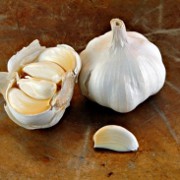 Photo: Getty Images
Photo: Getty Images
Garlic is a plant from the lily family that originated in central Asia and is now grown all over the world. The bulb of the plant is made up of between four and 20 cloves. This bulb is used as food and is made into a variety of herbal supplements.
Why Garlic is used
Garlic has been used as a medicine for thousands of years. During the 18th century, people drank crushed garlic in their wine to ward off the black plague. During World Wars I and II, soldiers were told to eat garlic to try to prevent gangrene in wounds.
Currently, garlic is used to help prevent heart disease, to reduce the build-up of plaque in blood vessels, to lower blood pressure and cholesterol, and to strengthen the immune system. Garlic may also have the ability to prevent certain types of cancer including stomach and colon cancers.
Science supports the claims that garlic can slow the development of atherosclerosis (hardening of the arteries) and that it can cause slight decreases in blood pressure. Some research studies show that garlic may be effective for lowering cholesterol while other studies do not show the same benefits. Research does not appear to support garlic as a way to prevent cancer.
How Garlic is used
Garlic can be eaten raw or cooked, and is available as a supplement in a variety of forms. Supplements can be made from fresh or dried garlic, garlic oil, or aged garlic extracts. The way garlic is taken can be significant. The active agent in garlic, called allicin, can be absorbed quickly in the mouth. However, stomach acid can deactivate allicin. This means that garlic must either be chewed thoroughly before swallowing so absorption can take place in the mouth, or should be taken in the form of supplements that are coated to survive stomach acid so they can be absorbed in the small intestine.
Cautions for Garlic
Garlic is commonly used as a food and is generally considered to be safe. Possible side effects from eating garlic include bad breath, body odor, heartburn, upset stomach, and allergic reactions. Other cautions for garlic include:
• Blood thinners – Garlic can act as a blood thinner similar to aspirin which may make it harder for clots to form. Talk to your health care provider about your use of garlic before having surgery or dental work. Use garlic with caution if you have a bleeding disorder.
• HIV – Garlic may interfere with protease inhibitors which are used to treat HIV infections.
• Antiplatelet medications – Garlic may increase the effectiveness of medications that inhibit the work of platelets in the body.
Be sure to tell your health care professionals about all the supplements you chose to take, including garlic.
Sources:
National Center for Complementary and Alternative Medicine
University of Maryland Medical Center
American Academy of Family Physicians






Add a CommentComments
There are no comments yet. Be the first one and get the conversation started!